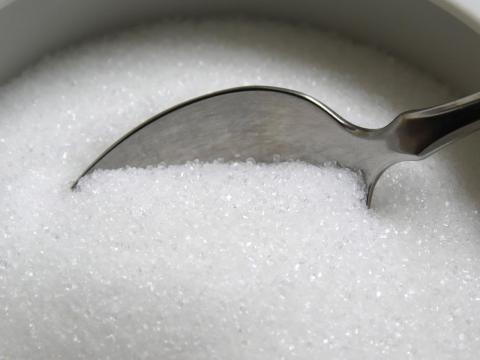Reactions to study linking sweetener consumption with increased cardiovascular risk
A study has associated the consumption of the sweetener erythritol with an increased risk of cardiovascular disease, specifically myocardial infarction and stroke. The data are published in the journal Nature Medicine.

Gunter Kuhnle - edulcorantes cardio EN
Gunter Kuhnle
Professor of Nutrition and Food Science, University of Reading
There is an ongoing discussion of the safety of sweeteners – partly because some studies show an increased risk for chronic diseases among those who consume sweeteners, especially in soft drinks.
It is therefore important to investigate the physiological effect of sweeteners, and this has been done in this study. Unfortunately, the authors decided to use an amount of sweetener that is – at least in the UK and Europe – unrealistic. The sweetener concentration they used was 10-fold higher than the permitted amount in drinks and the single dose they use was more than most of us would eat during an entire day.
The authors also find other physiological effects of erythritol but mainly at plasma concentrations that are higher than those found in the study cohort and presumably also the general public.
These results suggest a potentially adverse effect of erythritol when consumed a amounts above what is generally consumed in Britain or the EU – and this is one of the reason why regulators set limits for the use of food additives in sweeteners: to protect the public and ensure intake is in a safe range.
In contrast to these data in this new study, observational studies can provide much more reliable data about links between sweetener intake and health as they reflect normal diet. In this context, those studies measure actual intake which provides much better information on actual intake. Unfortunately, even those studies are affected by confounding and an association between high sweetener intake and ill health might not establish a casual relationship.
Unfortunately, the authors do not provide any information about the erythritol concentration found in the study populations and this makes an interpretation difficult. The study’s findings are surprising as only the group with the highest plasma erythritol concentration has a higher risk of disease – but not the others. This group also has the oldest participants, and when the authors adjust for this, the observed association with risk becomes much smaller.
The interesting question here is the origin of plasma erythritol, as this could potentially explain some of the results: erythritol is not only used in foods but also other products such as tooth paste and drugs. Especially the latter might affect the observed results as higher plasma concentrations could indicate that participants receive different medical treatments.
The press release is very cautious in making a bold claim, and I agree that the information is interesting and useful, but definitely not suitable to cause anyone to worry.
(The paper claims that erythritol has 'generally regarded as safe' [GRAS] status in Europe and this is incorrect. EFSA does not have a GRAS system.)
Oliver Jones - edulcorantes cardio EN
Oliver Jones
Professor of Chemistry, RMIT University, Melbourne (Australia)
This is a thought-provoking study based on good science. There were a high number of study participants and the data has been well analysed.
The authors not only found a potentially important association between levels of the artificial sweetener erythritol in the blood and health impacts, but they also took the trouble to show a viable way by which the effect they found could occur. Although this study can’t itself show whether or not this is the case, the authors suggest that higher erythritol levels may increase the risk of blood clots forming and this in turn may increase the risk of disease.
We should be mindful that correlation is not causation. As the authors themselves note, they found an association between erythritol and clotting risk, not definitive proof such a link exists.
Because the people in the study already had a lot of cardiovascular risk factors it can’t be shown that it wasn’t one of these other factors that caused the increased clotting risk rather than the erythritol. While some effects were seen in a test with healthy volunteers, this study only had 8 people in it and only lasted a few days. This is not enough to draw firm conclusions from, and the authors don’t try to do so.
While I think the finding certainly warrants further investigation don’t throw out your sweeteners just yet. This study only looks at erythritol and artificial sweeteners are generally considered safe. Any possible (and, as yet unproven) risks of excess erythritol would also need to be balanced against the very real health risks of excess glucose consumption.
“I don’t have any conflicts of interest to declare although I do work in the field of metabolomics (the study of small biological metabolites) which is one of the main techniques used in this paper.”
Rafael Urrialde - edulcorantes cardio EN
Rafael Urrialde de Andrés
Professor at the Faculty of Biological Sciences of the Complutense University of Madrid and at the Faculty of Pharmacy of the San Pablo-CEU University, and member of the Board of Directors of the Spanish Society of Nutrition
All scientific data, whether from studies, reviews or meta-analyses, must be reviewed by the European Food Safety Authority (EFSA), in this case as part of its re-evaluation programme for additives (Regulation 257/2010), which includes the 19 sweeteners authorised to date in the European Union. All studies, whether negative, neutral or positive, must be taken into account in order to adopt the appropriate decisions and positions, according to scientific validity. EFSA is the body that has to approve the scientific evidence and issue its scientific positions on food, nutrition and diet (more than 9,000 since it was created); in the case of sweeteners, it has not changed its positions and data to date, even in the totally exhaustive re-evaluations of sweeteners that it has carried out.
On the other hand, in the European Union, polyols, such as erythritol, xylitol and others, cannot be used, for example, in any type of beverage due to conditions of approval for use in EU legislation (Regulation 1333/2008). In turn, when they are used in other foods, according to Regulation 1169/2011 on food information provided to the consumer, if they exceed 10 % of the ingredient content, the following legend must appear on the label: "excessive consumption may cause laxative effects".
Erythritol also has two health claims approved and authorised by both EFSA and the EU authorities through Regulation 432/2012.
Polyols occur naturally in many fruits and vegetables, as well as in other plants, such as birch and its well-known birch sugar (xylitol).
This study, although the n=8 of the pilot study is very small, at least in the title of the paper it clearly states that its conclusions cannot be extrapolated to other sweeteners beyond erythritol. It should also be useful, even if it is based on an observational study, to be able to go deeper, especially with clinical trials of a sufficiently large size and with use below the ADI (Acceptable Daily Intake). This implies long-term studies.
"From 1986 to 1992 I worked at the Faculty of Biological Sciences in the Chair of Plant Physiology as a collaborator and developing the work of my doctoral thesis. In 1991-1992 I worked as a Scientific Collaborator in the Plant Freezing Unit at the Cold Institute of the Spanish National Research Council (Consejo Superior de Investigaciones Científicas). From 1992 to 2000 I worked in a Consumers' Association, in the Spanish Consumers' Union and in the Revista de Consumo Ciudadano (edited by 5 consumer associations), where I was the Director of Food and Health and the Technical Director, respectively. From 2000 to 2006 I worked at Puleva as Director of Food Safety and Health. From 2006 to 2020 at Coca-Cola Iberia as Deputy Director of Scientific and Regulatory Affairs and later as Director of Nutrition and Health. Since 2020 I am Professor in different Faculties of different Universities: Faculty of Biology of the UCM, Faculty of Pharmacy of the USP CEU, Faculty of Nursing of the University of Valladolid and I collaborate in different masters in food, applied plant biology and food safety of the Faculty of Veterinary Medicine of the UCM, of the Faculties of the Campus of Health Sciences of the University of Barcelona, of the Faculty of Pharmacy of the University of Seville and of the Faculty of Pharmacy of the University of Granada. I am a member or partner of several scientific societies: Spanish Society of Food Safety-SESAL, Spanish Society of Community Nutrition-SENC, Spanish Academy of Nutrition and Dietetics-AEND, Spanish Society of Nutrition-SEÑ, Spanish Society of Sports Medicine and member of the Board of Trustees of the Spanish Nutrition Foundation-FEN. In addition, I am a Full Academician of the Royal European Academy of Doctors-RAED and Honorary Academician of the Spanish Academy of Nutrition and Dietetics, President of the Scientific Committee of the Spanish Society of Sports Medicine and Member of the Board of Directors of the Spanish Society of Nutrition-SEÑ. Since March 2020, I have no conflict of interest because I have no contractual relationship of any kind with any food company, neither in the food processing or distribution sector, nor with any pharmaceutical company. I have only collaborated with Consumer Associations and Scientific Societies or I am a member of the Scientific Advisory Committee in some information platforms".
Witkowski et al.
- Research article
- Peer reviewed
- Observational study
- People



